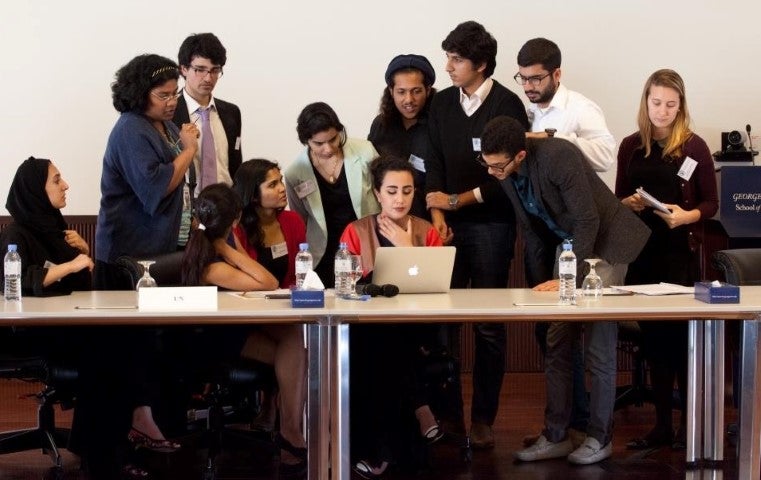GU-Q Students Negotiate Safe Return of Refugees During Crisis Simulation

Thirty-two Georgetown University in Qatar (GU-Q) students recently participated in a humanitarian-focused crisis simulation exercise at the Georgetown building in Education City.
GU-Q’s crisis simulations are based on a hypothetical situation relevant to a current international problem. During the process, students are assigned to teams and then special guests and faculty mentors lead the exercise. Participants read a background paper, receive the mock scenario, and then are instructed to follow the negotiating instructions.
The most recent simulation was set in the year 2015. During the simulation the students were responsible for facilitating the humanitarian response to Syria’s displaced population during an emerging peace process.
This allowed the simulation participants to gain experience in mock high-level negotiations between and among regional states, donor states, international humanitarian organizations, and post-conflict political entities. Just as in real humanitarian crises, the negotiations were limited by the capacities and obligations of the international humanitarian organizations tasked with the safe return and reintegration of refugees and internally-displaced persons.
Dr. Christine Schiwietz, assistant dean for academic affairs, said: “Tackling first-hand a humanitarian crisis is a valuable learning experience for students. A Crisis Simulation exercise is a way for students to understand different perspectives, motivations, and challenges when grappling with foreign policy issues.”
GU-Q partners with Georgetown University’s Institute for the Study of Diplomacy to hold crisis simulations that expose Georgetown students to complex negotiations and real-time decision-making. The simulations complement the students’ studies at GU-Q while providing teamwork experience during situations that necessitate high-stress thresholds.
The Institute’s director, James Seevers, moderated the recent negotiation exercise at GU-Q. Seevers said: “Each simulation is highly engaging and immensely challenging. The students learn that the solutions to crises are multi-fold and have a political, social, and economic impact globally. With cases such as the Syrian refugee and internally-displaced scenario, for example, the students found that the effects of humanitarian efforts ripple beyond the intended recipients.”